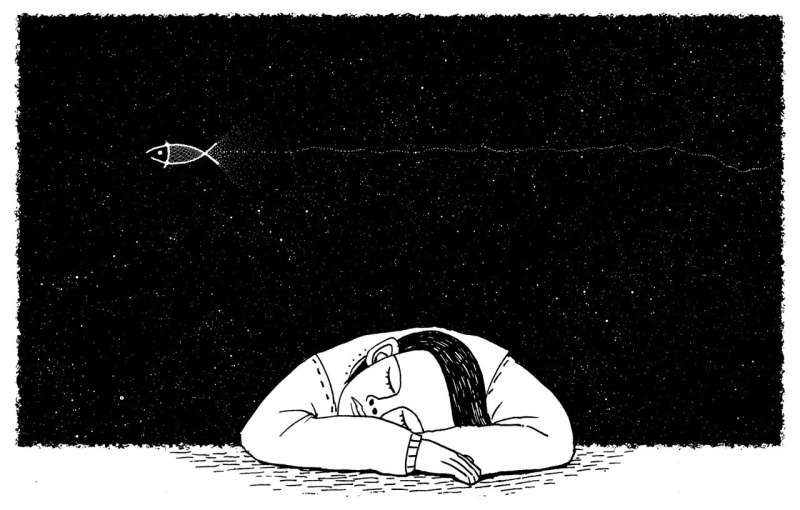
Credit: Pixabay/CC0 public domain
Two new studies are presented at the SLEEP Annual Meeting 2024 show that narcolepsy is an independent risk factor for cardiovascular disease and adverse cardiac events.
The results show that people with narcolepsy, compared to people without narcolepsy, had a 77% increased risk of cardiovascular disease and an 82% increased risk of major cardiovascular events. Their risk of stroke was two times higher, and they also had a 64% increased risk of heart failure or myocardial infarction, and a 58% increased risk of atrial fibrillation.
In a separate analysis of the same study population controlling for baseline use of stimulants, oxybates, and wakefulness, as well as time-dependent stimulant use, people with narcolepsy had an 89% increased risk of cardiovascular disease and a 95% higher risk of serious cardiac events.
“Through a carefully designed study that integrates propensity score matching, we found compelling evidence about the relationship between narcolepsy and cardiovascular disease,” said co-lead author Christopher Kaufmann, who has a doctorate in public health and is an assistant professor in healthcare. department of health outcomes and biomedical informatics at the University of Florida College of Medicine in Gainesville.
“Even after accounting for influential confounders such as diabetes and obstructive sleep apnea, our findings continue to underscore the significant association between narcolepsy and cardiovascular disease,” added co-lead author Dr. Rakesh Bhattacharjee, director of pediatric sleep medicine at Rady Children’s Hospital. San Diego and associate professor of pediatrics at UC San Diego.
According to the American Academy of Sleep Medicine, narcolepsy is a central condition of hypersomnolence characterized primarily by repeated daily episodes of an irrepressible need to sleep or lapsing into drowsiness or sleep. In some cases, drowsiness manifests itself as sudden, irresistible sleep attacks that can occur in unusual situations such as eating or walking. People who suffer from narcolepsy may also experience episodes of cataplexy, which involves sudden loss of muscle tone while maintaining consciousness, along with hallucinations or sleep paralysis during the transition from wakefulness to sleep.
The retrospective cohort studies used the 2005–2021 IBM MarketScan Commercial and Medicare Supplemental databases to identify people with a first diagnosis of narcolepsy and a comparison cohort of people without narcolepsy. Both study samples consisted of 34,562 people with narcolepsy and 100,405 matched controls. The patients had an average age of 40 years and 62% were women.
The researchers checked for the use of stimulants, oxybates, and other awakening-promoting agents, because these medications are often used to treat excessive daytime sleepiness associated with narcolepsy.
“Our study revealed a significant finding: the link between narcolepsy and cardiovascular disease persisted even after stimulant use was taken into account,” said lead author Munaza Riaz, who has a PhD in pharmaceutical outcomes and policy and is a postdoctoral associate in the pharmaceutical outcomes department. and policy within the college of pharmacy at the University of Florida.
“This suggests a direct correlation between cardiovascular disease and narcolepsy. Understanding the positive relationship between narcolepsy and cardiovascular disease, independent of stimulants, is meaningful for healthcare providers, especially when determining treatment options for patients.”
The research summaries were recently published in a online supplement of the news Sleep and will be presented Monday, June 3 and Wednesday, June 5 at SLEEP 2024 in Houston.
More information:
Christopher Kaufmann et al, 0857 Evidence for an independent association of cardiovascular disease in patients with narcolepsy, SLEEP (2024). DOI: 10.1093/sleep/zsae067.0857
Quote: Studies show narcolepsy is a risk factor for cardiovascular disease and adverse cardiac events (2024, June 3), retrieved June 3, 2024 from https://medicalxpress.com/news/2024-06-narcolepsy-factor-cardiovascular -disease-adverse. html
This document is copyrighted. Except for fair dealing purposes for the purpose of private study or research, no part may be reproduced without written permission. The content is provided for informational purposes only.
 Healthy Famz Healthy Family News essential tips for a healthy family. Explore practical advice to keep your family happy and healthy.
Healthy Famz Healthy Family News essential tips for a healthy family. Explore practical advice to keep your family happy and healthy.


